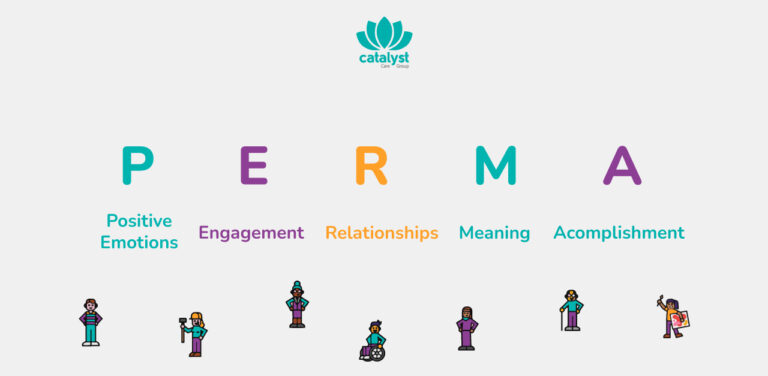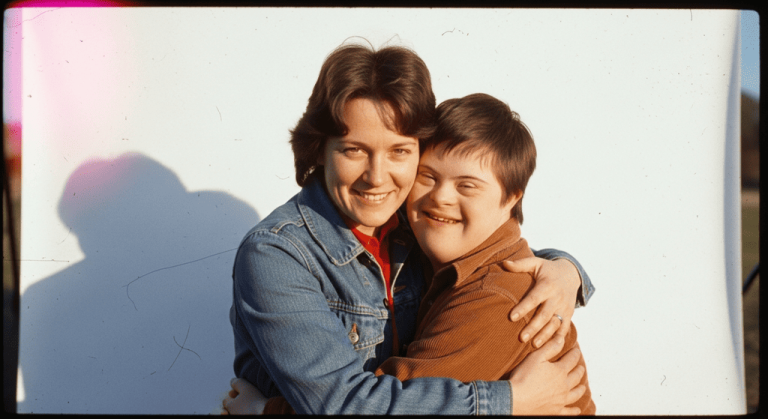“Often, it’s the small things in life that bring the greatest pleasure.”
Every person strives for happiness, regardless of age, gender, and socio-economic background. However, barriers and a lack of social support often prevent people from living a satisfying and meaningful life. Consequently, when people’s mental health is affected, their well-being is also affected.
Mental health concerns are common in England, and autistic people and people living with a learning disability often face increased vulnerability to these challenges. Barriers to mental health and well-being resources significantly affect how people act, interact, and grow. By proactively supporting all the components of the PERMA model of well-being, we not only increase people’s well-being, but we can help people flourish.
Definition of the PERMA Model
Positive mental health is characterised by the ability to manage daily activities effectively, encompassing productivity, strong relationships, and resilience to change and adversity. Martin Seligman created the PERMA model, a type of positive psychology. He suggests that positive mental health involves experiencing positive emotions and is more than the absence of mental health challenges.
The PERMA model of well-being is an approach to understanding and enhancing well-being by emphasising the cultivation of positive emotions, engagement, meaningful relationships, purpose, and achievement. It posits that a fulfilling life is achieved not just by ‘avoiding negative experiences’ but by actively pursuing and fostering these five elements to create a balanced and satisfying life.
Benefits of the PERMA Model for Mental Well-being
The PERMA model offers significant benefits by providing a holistic approach to well-being. By focusing on positive emotions, people can experience greater joy and reduce stress. Engagement helps people find fulfilment in their activities, nurturing productivity and satisfaction. Relationships enhance social support and connection, which are crucial for emotional health. Meaning brings a deeper sense of purpose and fulfilment, while accomplishment fosters motivation and a sense of achievement. Together, these elements help build resilience, increase overall happiness, and create a more balanced and enriched life.
In our extensive experience, the PERMA model of wellbeing has shown incredible results in improving people’s mental and overall well-being. This is particularly important for autistic people, people with a learning disability and people with mental health needs who have experienced trauma. It’s also significantly helped people with lived experience of delayed discharge.
Benefits of the PERMA model:
- Better Emotional Stability: By focusing on positive experiences and personal strengths, the PERMA model supports people in managing stress and improving emotional regulation.
- Improved Motivation and Engagement: Encouraging involvement in meaningful activities can increase motivation and overall satisfaction, making daily tasks and goals more achievable.
- Stronger Social Support: Emphasising the importance of positive relationships fosters connections with others, providing essential support and reducing feelings of loneliness.
- Increased Sense of Purpose: Finding and pursuing meaningful goals can provide a sense of direction and significance, contributing to greater overall fulfilment.
- Improved Self-Esteem: Achieving personal goals and recognising accomplishments can build confidence and self-worth, which are crucial for mental well-being.
- Better Coping Skills: Developing strategies for managing challenges helps enhance resilience and adaptability.
- Overall Life Satisfaction: Integrating these elements leads to a more balanced and enriched life, increasing overall happiness and satisfaction.
Integrating the PERMA model can also positively impact physical health. Experiencing positive emotions and engaging in enjoyable activities often leads to people being more active, such as going to the gym or playing sports.
Regular physical activity, in turn, has been shown to reduce symptoms of depression and anxiety, further supporting mental health.
By fostering a positive mindset and involving people in activities they find fulfilling, the PERMA model helps them manage stressful life events more effectively. This approach not only mitigates the effects of stress but also promotes overall well-being, contributing to a healthier, more balanced life.
Positive Outcomes Associated with the Perma Model:
- Improved quality of life
- Reduced risk of behaviours of concern
- Reduced risk of using restrictive practices
- Reduced risk of unnecessary hospital admission or readmission
- Effective integration in the community
- Increased independence, autonomy and confidence

Practical Applications of the PERMA Model
The PERMA model can help a wide range of people, including autistic people, people living with a learning disability, and people with mental health needs. It involves practical strategies tailored to their unique needs and strengths. These approaches can significantly enhance their quality of life by integrating principles such as positive emotions, engagement, relationships, meaning, and accomplishment.
This includes encouraging positive risk-taking, such as trying new activities or stepping outside their comfort zone in a supportive environment. These practical applications focus on creating meaningful, achievable experiences that promote well-being and foster personal growth.
Positive Emotions: Daily affirmations can be incredibly useful. People may create a visual board highlighting positive thoughts and thinking. They can also highlight aspects of their day or personal strengths, shifting focus toward uplifting thoughts and feelings. Additionally, incorporating time for activities they enjoy, such as listening to their favourite music, engaging in a hobby like drawing, or using sensory toys, supports emotional well-being.
Engagement: Engagement is achieved by identifying activities that align with people’s interests and strengths, such as working on puzzles, building models, or pursuing special interests. These activities help maintain focus and increase enjoyment. Structured flow activities, like setting aside regular time for hobbies or games, can be facilitated with visual schedules to help people anticipate and prepare for these activities.
Relationships: Relationships are an important aspect of life. Social skills training in groups or workshops can help people build and practice relationship skills in a supportive environment tailored to their understanding and comfort. Regular check-ins with family and friends, through activities like weekly dinners or consistent video calls, help people maintain and strengthen social connections.
Meaning: Engaging in purposeful activities, such as contributing to community projects or participating in advocacy groups related to personal interests, provides a sense of purpose. For people who communicate differently, visual supports can assist in understanding the impact of their contributions. Setting small, achievable goals related to people’s skills and celebrating each accomplishment reinforce their sense of purpose and achievement.
Accomplishment: Visual goal setting involves using charts or digital tools to break down larger goals into manageable tasks, such as creating a step-by-step guide for learning a new skill. Recognising and celebrating achievements with positive reinforcement, such as verbal praise, small rewards, or engaging in a favourite activity, helps build self-esteem and motivation.
Catalyst Care Group is Applying The PERMA Model of Well-being
Catalyst Care Group has an internal multidisciplinary team (MDT) of Positive Behaviour Support specialists, occupational therapists, speech and language therapists and community psychiatric nurses. Our integrated approach ensures safe and holistic support for the people we serve, including autistic people, people living with a learning disability, and people with mental health needs.
With a person-centred and therapeutic approach, we use a range of evidence-based practices to support people’s individual growth, development and well-being, including:
- Positive Behavior Support
- PROACT SCIPr
- PERMA model of well-being
- PACE model of care
- Multimedia support (Talking Mats, multimedia avatars, visual charts, video stories)
- Teletherapy
- Trauma-informed care
We work closely with the Restrain Reduction Network and the Loddon School to ensure that we implement innovative, value-based care models to provide the best possible outcomes for the people we serve.
As a family of organisations, Catalyst Care Group can support you with:
- Community Transition Services (CTS)
- Urgent crisis response
- Short-term and long-term community support
We are committed to making a difference in people’s lives. Get in touch with us today.













